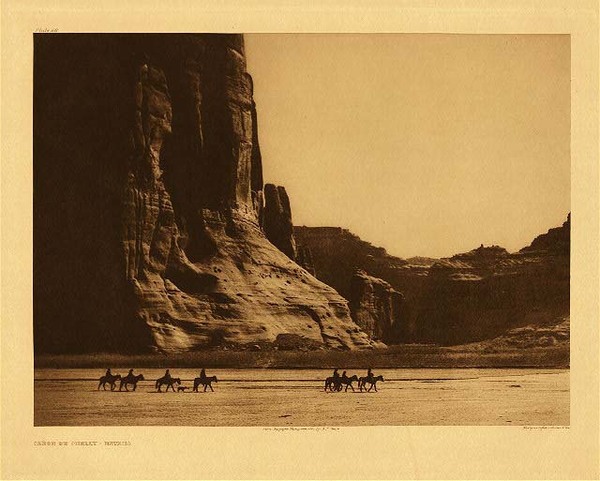Edward S. Curtis (1868-1952)
View Artist Biography
SOLD
Title:
Plate 028 Canon de Chelly - Navaho
Date:
1904
Size:
Portfolio, 18 x 22 inches
Medium:
Vintage Photogravure
Written by Edward Curtis: A wonderfully scenic spot is this in northeastern Arizona, in the heart of the Navaho country - one of their strongholds, in fact. Cañon de Chelly exhibits evidences of having been occupied by a considerable number of people in former times, as in every niche at every side are seen the cliff-perched ruins of former villages.
QUOTES FROM "THE NORTH AMERICAN INDIAN: "The Navaho are a pastoral, semi nomadic people whose activities center in their flocks and small farms...While the Navaho leads a wandering life, the zone of his movements is surprisingly limited; indeed the average Navaho's personal knowledge of his country is confined to a radius of not more than fifty miles."
DWELLINGS: A Navaho house is called a "Hogan" and is made of logs, brush, and earth. Summer houses are also utilized and made of brush with a windbreak.
"Although raiders and plunderers since known to history, the Navaho cannot be designated a warring tribe, for however courageous they may be, their lack of political integrity has been an obstacle to military organization. They never have had a tribal chief, properly so called, while many leading men could never command more than a small following."
QUOTES FROM "THE NORTH AMERICAN INDIAN: "The Navaho are a pastoral, semi nomadic people whose activities center in their flocks and small farms...While the Navaho leads a wandering life, the zone of his movements is surprisingly limited; indeed the average Navaho's personal knowledge of his country is confined to a radius of not more than fifty miles."
DWELLINGS: A Navaho house is called a "Hogan" and is made of logs, brush, and earth. Summer houses are also utilized and made of brush with a windbreak.
"Although raiders and plunderers since known to history, the Navaho cannot be designated a warring tribe, for however courageous they may be, their lack of political integrity has been an obstacle to military organization. They never have had a tribal chief, properly so called, while many leading men could never command more than a small following."
